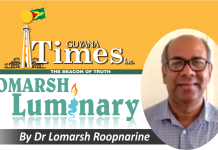Over the past month or so I have been analysing Caribbean Indian identity, namely ethno-local and ethno-national. In this column, I will move on and analyse the third of the multipartite model of Indian identity – ethno-trans-Caribbean.
An ethno-trans-Caribbean identity is when an individual does not identify or see him or herself in relation to a specific country in the Caribbean but identifies with other countries across the Caribbean. Put differently, individual as well as collective thoughts, feelings, and behaviours are associated with other countries in the Caribbean rather than be restricted to one specific country.
When asked, for example, who are you, where are you from, the general reply is that I am a Caribbean person. However, this form of identity is restricted within Caribbean countries that share somewhat similar cultural characteristics.
Spanish-speaking individuals or Hispanics in the Caribbean tend to identify with Cuba, Puerto Rico and the Dominican Republic, and so when they say they are from the Caribbean they are implicitly referring to an insular trans-Caribbean identity in the northern Caribbean.
Similar sentiments of identity are found amongst African Caribbeans, although these sentiments are further separated according to language and religious affiliations. Rastafarians share a typical trans-Caribbean identity but French Caribbean Africans may not identify with English-speaking Africans, for example.
The legacy of colonialism is mainly responsible for this insular identity but there are efforts to address this colonial sin through various Pan African-Caribbean movements.
As far as Indians are concerned, they share an ethno-trans-Caribbean identity with Guyana, Trinidad, and Suriname, countries with large Indian populations, rather than with Antigua, St Kitts, Puerto Rico, or Cuba with small populations of Indians and a different sense of identity.
An ethno-trans-Caribbean identity is not common among Indians but it is an alternative form of identity that cannot be easily dismissed. This form of identity is religiously-oriented in the form of Hinduism and Islam to provide a sense of security and stability for trans-Caribbean Indians. It is expressed through the assertive Indian Council for Culture (ICC), Arya Samaj, Santan Dharma, as well as other Islamic and Christian organisations, although the latter may comprise other ethnic groups like Africans in the Christian Baptist religion.
These religious organisations have pushed for Indian empowerment, recognition, and revitalisation in a Creolized Caribbean. See the works of Morton Klass (1996) for Indian revitalisation movement in Trinidad and Van der Veer and Vertovec (1991) for Brahmanism across the Caribbean.
The establishment of a private Hindu school in 2002 in Guyana by Swami Aksharananda represents not only a need for the revitalisation of Hinduism in Guyana but also in Trinidad and Suriname. I understand that the Swami plans to build a dormitory for teachers and researchers as well as a Hindu university to attract Indians from across the Caribbean and further afield.
Muslims in Guyana have also intensified and broadened their external contacts, not only with India and Pakistan, but also with countries in the region – Trinidad and Suriname – and with the Arab world. What has happened in the process is the formation of an ethno-trans-Caribbean identity, creating a common space where Muslims meet and mingle through regular visits.
Interestingly, an ethno-trans-Caribbean identity is not restricted to the insular Caribbean but it is also noticeable and vocal in the Indian North American and European diaspora. This is possible because, as Benedict Anderson (1991) suggests elsewhere, a trans-Caribbean identity can be imagined. Even though Indians in the diaspora have no personal knowledge of each other, they share a civic nation in which similar values, interests, images of camaraderie, citizenship, and community are expressed.
It is in New York, Toronto, and London, for example, where the images of a civic trans-Caribbean identity are expressed. To feel connected with their trans-Caribbean identity in these new societies that discriminate, Indian Caribbean immigrants have formed associations like the Ontario Society for Services to the Indo-Caribbean Community (OSSICC) to deal with the everyday challenges of North American society and to practice segmented assimilation patterns, that is, maintaining contact with the Caribbean while integrating selectively into North American society.
These Indians express a trans-Caribbean identity through their trans-national lifestyle. They are in Canada but their Caribbean past is highlighted, their achievements in Canada are appreciated, and their differences from Canada are valued. Some of this is expressed in associations, religious domains, clubs, newspapers, and radio stations.
For some, a search for or an expression of ethno-trans-Caribbean identity is genuine, while for others it is an excuse for claims and counter-claims in a foreign land. In consequence, misplaced and misguided feelings may prevail










